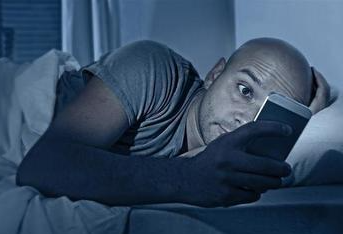
Doctors Are Warning Anyone Who Uses Phones Before Sleep to Stop Immediately Due to…
You’ve finished watching the evening news, brushed your teeth, and settled into bed. The day is done. As a final, comforting ritual, you pick up your smartphone to scroll through Facebook, check emails, or read the news. It feels like a harmless way to unwind—a quiet moment to yourself before drifting off to sleep. But doctors and sleep specialists are now issuing urgent warnings about this common habit, and the reason goes far beyond what most people realize.
For those of us in our 50s, 60s, and beyond, quality sleep becomes increasingly precious—and often more elusive. That final check of your phone isn’t just cutting into your sleep time; it’s actively sabotaging the quality of whatever sleep you do get. Here’s why medical professionals are so concerned.
The Blue Light Deception: Tricking Your Brain into Alertness
The most immediate culprit is the screen itself. Your phone, tablet, or laptop emits a significant amount of blue light. During daylight hours, this type of light is beneficial—it helps regulate our circadian rhythm, the body’s internal 24-hour clock that tells us when to be awake and when to sleep.
However, when this same blue light hits our eyes at the evening hours, it tricks the brain into thinking it’s still daytime. This directly suppresses the production of melatonin, the crucial hormone that signals to your body that it’s time to wind down and prepare for restorative sleep. For older adults, whose natural melatonin production may already be declining, this artificial suppression is particularly damaging.
The result isn’t just taking longer to fall asleep. The sleep you do get is likely to be shallower and less restorative. You might spend seven hours in bed but wake up feeling as if you only got four, because you’ve been robbed of the deep, slow-wave sleep that’s essential for memory consolidation and physical repair.
The Mental Stimulation Trap: Never Truly Powering Down
The content you consume matters just as much as the light. Scrolling through social media, reading work emails, or checking news headlines throws your mind into a state of heightened engagement. Unlike reading a book or listening to calm music, digital content is designed to capture and hold your attention.
- You see a political post that makes you anxious
- You read a work email that gets you thinking about tomorrow’s problems
- You compare your life to others’ highlight reels on social media
This “cognitive arousal” activates your nervous system, making it difficult to achieve the mental quiet necessary for sleep onset. Your brain, instead of slowing down for the night, is now processing complex information, managing emotional responses, and planning for the future.
The Physical Consequences: More Than Just Fatigue
The impact of pre-sleep phone use extends far beyond simple tiredness. Chronic sleep disruption is linked to:
Weight Gain and Metabolic Issues
Poor sleep disrupts the hormones that regulate appetite (ghrelin and leptin), often leading to increased cravings for high-calorie foods and potential weight gain.
Mood Disturbances
Sleep deprivation makes us more irritable, less patient, and more vulnerable to anxiety and depression.
Increased Health Risks
Long-term sleep issues are associated with higher risks of hypertension, heart disease, and cognitive decline.
Breaking the Cycle: A Doctor-Recommended Digital Sunset
The solution isn’t to abandon technology, but to create healthier boundaries. Sleep specialists recommend implementing a “digital sunset”—a complete shutdown of electronic devices at least 60 minutes before bedtime.
Create a New Wind-Down Routine
Replace phone scrolling with activities that genuinely promote relaxation:
- Read a physical book or magazine
- Practice gentle stretching or meditation
- Listen to calming music or an audiobook
- Journal or write down thoughts from the day
- Enjoy quiet conversation with your partner
Make Your Bedroom a Technology-Free Sanctuary
Charge your phone in another room overnight. Use a traditional alarm clock instead of your phone’s alarm function. This removes temptation and reinforces that your bedroom is for rest and intimacy only.
If You Must Use Devices, Be Smart About It
If complete avoidance isn’t possible, enable “night mode” settings that reduce blue light emission, keep the device at least 14 inches from your face, and dim the screen brightness as much as possible.
Your evening routine should serve your health, not undermine it. By making this one change—putting down the phone before bed—you’re investing in better sleep, improved mood, sharper mental clarity, and long-term health. The temporary satisfaction of one more scroll isn’t worth sacrificing the profound benefits of deep, restorative sleep. Your body and mind will thank you with better health and more energized mornings. Tonight might be the perfect time to start this new, healthier habit.